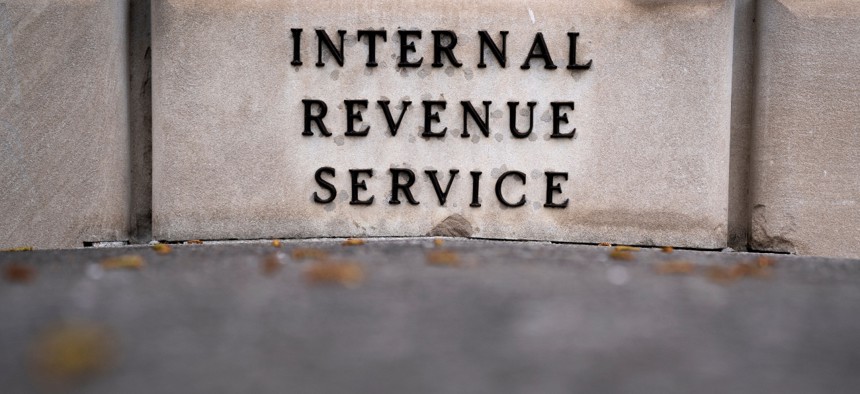
STEFANI REYNOLDS/Getty Images
Some Specifics Emerge on How the Senate-Backed Tax-and-Climate Bill Would Impact Agency Staffing Levels
One agency will grow less than some claim, while another would see an unexpected boost.
The federal government is primed to hire tens of thousands of new employees in the coming years under the Democrats’ climate and tax bill the Senate passed on Sunday, though the impact at one agency could be far less impactful than some opponents are claiming.
The Inflation Reduction Act, which cleared the upper chamber of Congress over the weekend with only Democratic support, would provide funding for the Internal Revenue Service to hire as many as 87,000 employees over the next 10 years. Democratic lawmakers and the Biden administration have called the surge necessary to restore the agency after massive cuts that have taken place at the agency over the last decade and to crack down on high-earning tax cheats. Republicans, however, have sounded the alarm on the hiring and voted for a failed amendment that would have stripped the bill of its IRS staffing push.
“It doubles the size of the IRS,” Sen. Ted Cruz, told Fox News on Sunday, echoing a complaint voiced by many Republicans. “The Democrats are making the IRS bigger than the Pentagon, plus the Department of State, plus the FBI, plus the Border Patrol, combined. The IRS is going to be bigger. This is a massive power grab.”
The tax and climate bill includes $80 billion over 10 years for IRS. When the Biden administration first floated that funding total as part of an infrastructure package last year, it released a report finding it could use the money to hire 86,852 employees. The Treasury Department said IRS would hire around 5,000 workers in the first year and slowly grow that to around 12,000 annually toward the end of the 10-year window. The administration and Senate Democrats, however, said that number is partially accounting for the tens of thousands of employees IRS expects to leave through natural attrition in the coming years.
“The IRS has a very old workforce,” said Ashley Schapitl, a spokesperson for Democrats on the Senate Finance Committee.
The National Treasury Employees Union, which represents 70,000 IRS workers, estimated about 50,000 employees would leave over the next six years. Instead of more than doubling the current IRS workforce, the Democrats’ bill would—in that scenario—increase it by about 44%. While a significant change in the trajectory of the agency, it would bring the workforce in line with the levels it saw about 20 years ago. A Treasury Department official said the claim that IRS would net 87,000 auditors and double its workforce was "absolutely false."
"A large portion of these hires will fill vacancies of employees who have left or who will in coming years leave or retire from the agency," the official said, adding that those employees would work not just in enforcement but in IT and customer service as well.
Advocates for the change, who include the current and many former IRS commissioners, said the agency is taking on more work than ever and has neglected much of its core mission as staffing has continued to decline due to prolonged budget cuts.
Charles Rettig, the current IRS head, has vowed to act quickly to get the new employees on board, telling lawmakers last year his agency has already spent months developing hiring plans so IRS can hit the ground running as soon as new funding is approved.
“We don’t plan to wait six months to implement what Congress provides to us,” Rettig said. “We will be ready.”
The Treasury official added plans for the surge are "already well underway." Rettig explained that while there will be a learning curve for new hires, IRS will target not just young people but also mid and late-career staff who can enter its workforce with managerial experience and other practical skills. The bill originally granted direct hire authority for IRS and gave the agency permission to pay up to 500 employees special, boosted salaries, but those provisions were stripped from the bill's final version due to the constraints of the legislative procedure Democrats used to pass it. Congress could still give the expedited hiring authority as part of the appropriations process, as it did for fiscal 2022. Rettig has said that authority "rescued" the agency from "death."
Still, the National Taxpayer Advocate warned last year that IRS is "not equipped to handle the influx of hiring the IRS needs.” NTEU President Tony Reardon said the pacing of the funding, spaced out over 10 years, would allow IRS to build up its capacity over time.
“The brilliance of this whole plan is that it makes available this new funding over 10 years to allow the IRS to thoughtfully restore its workforce and strategically target its improvements, year after year,” Reardon said.
The Congressional Budget Office estimated it would raise more than $200 billion in revenue, or a net of $124 billion. Cruz, again like other Republicans, said the bill’s addition of IRS personnel was “not designed to come after the billionaires and the corporations,” but middle-class Americans and small businesses. The measure is expressly aimed at high-income taxpayers, however, targeting those making more than $400,000. Rettig has said boosted enforcement would focus on high net-worth individuals, large pass throughs, corporate compliance, employment tax field examinations and non-filers with virtual currency, among others.
“The resources in the reconciliation package will get us back to historical norms in areas of challenge for the agency—large corporate and global high-net-worth taxpayers—as well as new areas like pass-through entities and multinational taxpayers with international tax issues, where we need sophisticated, specialized teams in place that are able to unpack complex structures and identify noncompliance,” Rettig said in a letter to lawmakers last week. “These resources are absolutely not about increasing audit scrutiny on small businesses or middle-income Americans.”
Part of the hiring would go toward improving the taxpayer experience, as the agency has slashed nearly 9,000 customer service representatives since 2010. The Democratic bill would provide $3 billion for taxpayer services, $46 billion for enforcement, $25 billion for operations support and nearly $5 billion for business systems modernization. IRS answered just 9% of calls in the 2021 tax filing season and 10% in 2022.
More Hiring
The Inflation Reduction Act would also provide $500 million to the National Parks Service to fill longstanding vacancies and increase its workforce. Matthew Felling, a spokesman for Sen. Angus King, I-Maine, who chairs the Senate Energy and Natural Resources Committee’s panel that oversees NPS, said the bill would fund a total of 5,000 hires spread out over the next decade.

The hiring surge represents “a significant addition that will help improve the experience for the record numbers of visitors that our public lands are enjoying.”
NPS staffing has declined from 16% over the last decade to less than 19,000, while visitation to National Parks has increased by 18% in the same period. King previously joined with his ranking member, Rep. Steve Daines, R-Mont., in calling for a reversal of that trend.
“NPS staff are some of the most mission-driven employees in the federal government, and we should be ensuring that they have the support they need to continue serving the public and protecting our national treasures,” the senators wrote in a letter to appropriators earlier this year. President Trump in 2020 signed into law the Great American Outdoors Act—which provided nearly $10 billion over five years for NPS to address its maintenance backlogs—but the lawmakers said the agency would not be able to carry out that work without proper staffing.
Other agencies would also see their operations and staffing levels altered as part of the bill's $369 billion investment to boost energy security and fight climate change. The National Oceanic and Atmospheric Administration would receive $20 million and the Environmental Protection Agency $40 million to hire staff to improve their permitting processes. The Federal Energy Regulatory Commission would be allocated $100 million, the Energy Department $125 million and the Interior Department $150 million to boost its rolls for environmental reviews.
The House is expected to return from recess to pass the measure later this week. President Biden is then expected to sign the measure into law.
This story has been updated with comment from the Treasury Department and corrected to note the removal of the direct hire provision.
NEXT STORY: Don’t Fear the Public Service Reform Act







